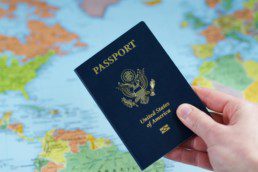Smart Depart: What to Expect from Escorted Tours
https://www.youtube.com/watch?v=Apr-F8Klv_4&feature=youtu.be
AAA Travel is proud to present our newest broadcast of our SmartDepart Safety Series, What to Expect Touring. Hear from industry leaders at AAA Member Choice Vacations, Club Adventures and other AAA Travel partners! Learn about safety changes, group sizing, new protocols and more.
Disney Announces Commitment to Health & Safety Measures
On Saturday, the phased reopening of Walt Disney World Resort will begin. Here is what park visitors need to know, and what they can expect, as they return to the park.
1. Health & Wellness
- Limited and carefully managed attendance: All guests will be required to make advanced ticket purchases and reservations.
- Reduced capacity and physical distancing: Disney is reducing capacity by letting fewer people enter parks and are adjusting experiences to allow for physical distancing, a key measure reinforced by the CDC. This includes physical distancing in dining experiences, attractions, queues and other locations. Additionally, physical barriers have been installed in areas where physical distancing may be difficult to maintain, like cash registers.
- Temperature checks: Quick temperature checks are required for all guests at entry to theme parks.
- Face coverings: Disney will be requiring both cast members and guests ages two and older to wear a face-covering – unless swimming or when eating or drinking – and enforcing this policy across parks and resorts.
- Handwashing and hand sanitizer: Parks have increased the number of hand sanitizer locations and handwashing stations throughout parks and resorts.
- First Aid locations: First aid locations are staffed by experienced nursing staff and have updated their protocols for responding to symptoms of illness.
2. Cleaning & Disinfecting
- Increased cleaning & disinfecting: Disney is increasing the frequency of cleaning, especially for frequently-touched surfaces and high-traffic areas. Following park close, each park will receive enhanced cleaning before guests arrive the next day.
- New procedures for resort stays: In addition to increasing cleaning in areas such as elevators and escalators, handrails, tables, handles, and restrooms, Disney has updated procedures for guest rooms at Disney owned-and-operated Walt Disney World hotels. Before arrival, every room will be given an enhanced cleaning and a light cleaning service (including removal of trash and replenishment of towels and amenities) will be offered every other day during the stay.
3. Technology Solutions
- Disney apps: With the My Disney Experience and Disneyland apps guests already know and love, guests can view hand sanitizer locations, explore digital menus, and more.
- Limited-contact options: From Mobile Order and cashless payments to Walt Disney World’s MagicBands and online check-in at select locations, Disney is offering technology solutions that can make it easier for guests to minimize contact and maintain physical distancing.
4. Cast Member Training & Workplace Safety
- Training: Cast members are receiving additional training on both new measures and the continued importance of personal health and hygiene, such as handwashing and of course, staying home when ill. For some, this includes training on how to help everyone who visits to follow new health and safety measures, including wearing a face covering and maintaining physical distancing.
- Workplace health and safety: Disney increased the frequency of cleaning in work areas, adjusted work practices to promote physical distancing, and introduced new protocols for temperature checks and face coverings.
- Health screenings: Cast members will self-screen for temperature and symptoms of illness before each shift and will stay home if they are not feeling well.
5. Working Together
- Guest communication: Disney is proactively sharing information with guests about what to expect ahead of their visit to support their planning. In parks and resorts, the parks have added signage about personal health and hygiene measures, physical distancing, and more.
- Following guidelines: A special group of cast members will also be present in the parks to explain new procedures, answer questions guests may have and encourage everyone to follow these measures to promote the well-being of us all.
- “Together We Can Make Today Incredible” campaign: In June, Disney introduced “Together We Can Make Today Incredible,” a health and safety campaign that spotlights healthy behaviors featuring fan-favorite characters from the Incredibles animated movies. The campaign emphasizes that everyone has an important role to play in health and safety while engaging guests in a uniquely Disney way.
You may have questions, and AAA Travel is here to help! Contact your AAA Travel Agent at 1-800-222-7448
Healthy Sail Panel Created to Tackle COVID-19 at Sea
Royal Caribbean Group and Norwegian Cruise Line Holdings together launched the "Healthy Sail Panel," a task force charged with uncovering solutions to the cruise industry's approach to keeping ship passengers and crew safe from the coronavirus. The panel will examine safety measures ranging from the use of ultraviolet lights to safe meal service, and everything in-between. The panel is also forecasting costs that may result from their suggestions, such as modifying ships to encourage social distancing.
But the learnings and enhancements may mean more to the cruise lines than just addressing COVID-19. Long term adjustments to ships and regulations could aid in the overall prevention of diseases, including any that might pop up in the future, and the dreaded Norovirus.
The panel has held two sessions to date. The panel’s short-term recommendations could take two months to develop and release, and ideas for longer-term implementations could take up to a year. For now, cruise ship fleets around the world remain docked. Major operators have extended the cruising suspensions into September.
Yes, COVID-19 has sickened and even killed passengers and crew earlier this year, yet ships have the advantage of a more controlled environment. Operators can regulate the flow of passengers through hallways, launch technology to best find or kill the virus and establish rules about congregating faster and more targeted than cities and states.
If you are preparing for a cruise, or have questions about an upcoming voyage, AAA Travel Agents are here to help. Speak to a AAA Travel Counselor now, call 1-800-222-7448.
Global Entry Enrollment Reopens
Great news for the West Coast, but Northeast residents will need to be patient. As a sign that Americans and our infrastructure are looking to return to travel, the Los Angeles International Airport Global Entry enrollment center is set to reopen on July 6. Conditionally approved Global Entry applicants will be allowed to schedule an interview to complete their enrollment into the program.
Global Entry is known for granting air passengers access to faster lines through airport customs and immigration when returning to the U.S. after an international trip. The program has been shuttered since March 19 as the coronavirus outbreak became more apparent in the U.S. The suspension had seen an extension in May to last until at least July 6, and this recent announcement may be a sign that the program is preparing for a wider re-entry to market.
As expected, the Los Angeles airport enrollment center will have new social-distancing protocols. Travelers will experience a reduced number of appointments, smaller waiting areas, and barriers at service counters. All employees and visitors at the center are required to wear face masks.
Applicants must schedule their in-person interview online.
What remains uncertain is the timeline for other enrollment centers to open. There has been no note to when mobile enrollment will start again. Current members of Global Entry are given an 18-month grace period to continue to use their memberships after they expire, as long as they apply for renewal before the expiration date.
TSA PreCheck continues operating in-person interviews at different public facilities across the country.
EU Restricts USA Travelers
The European Union started accepting non-essential travelers this week, but one nation not on their list of approvals is the United States. This is a temporary situation, but it has left many travelers wondering what it means for their future travel plans. AAA Travel is here to help break down the facts on this restriction.
Are USA travelers the only one being restricted?
No. In fact the approved list is quite precise. As of July 1, European Union nations, as well as the non-E.U. European nations of Iceland, Norway, Switzerland and Liechtenstein began opening their borders to residents of Algeria, Australia, Canada, Georgia, Japan, Montenegro, Morocco, New Zealand, Rwanda, Serbia, South Korea, Thailand, Tunisia and Uruguay.
Residents of Andorra, San Marino, Monaco and the Vatican will also be allowed entry.
European nations may individually lift restrictions on travel as time progresses.
Residents of the United States are not allowed to enter the European Union unless they qualify for an exception.
What are the exceptions?
Americans are still granted access to Ireland and Britain, both of which lie outside Europe’s Schengen Area. Both Ireland and Britain require mandatory 14-day quarantines on arrival. Britain will fine £1,000 (about $1,230) for violating quarantine rules.
The restrictions do not apply to European citizens or residents “independent of the purpose of travel,” according to the official recommendation, nor to health workers, seasonal farm workers, diplomats, humanitarian workers, transit passengers, asylum seekers, students and “passengers traveling for imperative family reasons,” among a handful of other exceptions.
American citizens living in one of the countries on the approved list. What are my options?
The rules are based on the country of residence. American citizens may be allowed to enter Europe if they are residents in one of the countries on the approved list. At the same time, citizens of approved countries who reside in the United States may not be allowed entry. In either case, before traveling, it’s best to check with the border control authority of the European country that you wish to visit.
Did Iceland and Portugal change their restrictions?
Recently, Icelandic officials stated the country would be open to visitors from the United States and other places, provided they submit to a Covid-19 test on arrival. This has changed. Iceland is welcoming visitors only from Europe. The same is true in Portugal, unless travelers are also Portuguese residents or qualify for some other exception.
What are the options for refunds and postponements?
If you have already booked a flight to Europe, you should be entitled to either a flight credit or a refund, depending on when you booked and what type of ticket you purchased. The same may be true for resorts, hotels, and additional travel service providers. Contact your AAA Travel agent to help you navigate the rules and regulations for your individual travel plan.
How long will this restriction be enforced?
European officials will review the terms of this restriction every two weeks.
You may find yourself looking for additional information. AAA Travel is here to help. Speak to a AAA Travel Counselor now, call 1-800-222-7448.
New England Road Trip: Restriction Spotlight
AAA Travel's quick guide to New England travel restrictions is designed to offer a glance into the regulations and rules that may impact your summer travel plans. While parts of the United States continue to see coronavirus numbers rise, the Northeast is adjusting travel restrictions to ensure the number of cases in this region continues to trend downward.
Current travel restrictions in Northeastern states., as of June 29th, 2020.
Massachusetts
- Encouraged to self-quarantine for 14 days regardless of where they are arriving from.
- A “safer-at-home” advisory is in place, which asks residents to “leave home only for healthcare, worship and permitted work, shopping, and outdoor activities.”
Rhode Island
- Travel restrictions have largely been lifted.
- A 14-day quarantine is in place for people who are returning to Rhode Island from an area that is under a stay-at-home order or similar type of restriction.
- Governor Gina Raimondo considering requiring visitors from areas with high coronavirus infection rates to quarantine.
New York, New Jersey, and Connecticut
- Urge people arriving from states with high coronavirus infection rates to self-quarantine for 14 days.
- New guidance applies to anyone traveling to the tri-state area from states with new daily positive test rates higher than 10 per 100,000 residents or from states with a 10 percent or higher positivity rate over a 7-day rolling average.
As of publication, the states that meet the criteria are Alabama, Arkansas, Arizona, Florida, North Carolina, South Carolina, Texas, and Utah.
Vermont
- Visitors can avoid quarantine requirements when arriving in Vermont if their home county has less than 400 active cases of COVID-19 per 1 million residents.
- Residents who are returning by car from counties in New England or New York that have similar active caseloads to Vermont don’t need to quarantine.
Maine
- All out-of-state travelers who are visiting Maine, and Maine residents who are returning home, quarantine for 14 days when arriving.
- People who test negative for the coronavirus within 72 hours of arriving in Maine don’t have to quarantine. Residents of New Hampshire and Vermont are exempt from the testing and quarantine requirements because the number of active coronavirus cases in those states is similar to Maine’s.
- Visitors not from a Maine, New Hampshire, or Vermont residence will be asked to sign a form saying they have tested negative for COVID-19, are planning to complete the 14-day quarantine, or have already completed their quarantine.
- Maine lodging establishments are allowed to serve people who are not residents of Vermont, New Hampshire, or Maine, the form must be provided to check-in at campgrounds, seasonal rentals, overnight camps, and other commercial lodgings, like Airbnb.
New Hampshire
- Encouraging people to remain in their home state until additional restrictions are lifted.
- Visitors, regardless of where they are coming from, are asked to self-quarantine for 14 days and are encouraged to follow the latest travel guidance from the Centers for Disease Control and Prevention.
You may have questions, and AAA Travel is here to help. Contact your travel agent or visit aaa.com/travel for more information and up to date travel options.
Passport Questions? Find the Answer.
With COVID-19 impacting our economy and government processes, passport agencies are feeling the impact of reduced staff and limited office locations. AAA members may be wondering where their renewed passport is, or why they have yet to receive a confirmation on paperwork. AAA Travel has gathered your most common questions and dug deep in our resources to find answers to your passport concerns.
1. What is the current status of passport operations?
As of June 11, various passport agencies and centers are entering phase one of the government's reopening plan. Go to our Passport Agency and Center page for more information.
Passport agencies and centers are only open to assist customers who need a passport in the next 72 hours for a life-or-death emergency. For the health and safety of employees and customers, agencies are minimizing the number of times employees and customers come together in facilities and centers. Customers must make an appointment for life-or-death emergency service and cannot walk into agencies or centers.
2. What services can I expect in each phase of reopening?
The Department will resume processing passports in phases while protecting the safety of both staff and travelers.
Phase 1: Limited processing of applications already received. Applications will be processed on a first-in, first-out basis, beginning with the oldest applications received. Customers with life-or-death emergencies by appointment only. Customers must wear cloth face coverings in all common areas, including lobbies, and observe strict social distancing. During phase one, it is recommended customers wait to submit new or renewal applications as delays will continue.
Phase 2: Applications will remain processed on a first-in, first-out basis, beginning with the oldest applications received, while prioritizing life-or-death emergency cases. More appointments at agencies and centers will be offered. Services offered at agencies will continue to be by appointment only. Staff and customers should wear cloth face coverings in all common areas, including lobbies, and continue to observe social distancing. During phase two, it remains recommended that customers wait to submit new or renewal applications as delays will continue.
Phase 3: Resuming of normal operations. Agencies begin to offer a processing time commitment for routine service and resume expedited service in this phase. You should continue to make an appointment to apply at an agency or center. Agencies address applications on a first-in, first-out basis, focusing on the oldest applications. Staff and customers may wear cloth face coverings in common areas and all are encouraged to maintain social distancing.
3. Are offices making progress on U.S. passport applications?
Yes. Every Thursday, the government publishes U.S. passport statistics. You can find historical U.S. passport statistics on our Reports and Statistics page.
4. Why can't employees work on passport applications from home?
Passport applications must be adjudicated in agencies and centers to protect customers’ personally identifiable information and ensure the integrity of the application process. Agencies must physically print and mail passport books and cards back to customers from approved facilities.
5. What qualifies as a life-or-death emergency?
Life-or-death emergencies are serious illnesses, injuries, or deaths in your immediate family (parent, child, spouse, sibling, and grandparent) that require you to travel outside the United States within 72 hours (3 days).
You must provide:
- A passport application with supporting documents
- Proof of the life-or-death emergency such as a death certificate, a statement from a mortuary, or a signed letter from a hospital or medical professional. Documents must be in English or translated in English.
- Proof of international travel (e.g. reservation, ticket, itinerary) specific to the emergency.
To make an appointment at a passport agency or center for a life-or-death emergency, you must call our National Passport Information Center at 1-877-487-2778 (1-888-874-7793 TDD/TTY) on Monday- Friday, 8:00 am to 5:00 pm Eastern Time, except federal holidays. Call 202-647-4000 outside of these hours to make an appointment.
6. I already submitted an application. How long will it take for me to receive my passport and my citizenship evidence documents?
You will continue to experience delays in phase one and phase two. To see the current wait times to receive your passport and the return of your citizenship documents such as previous passports, and birth and naturalization certificates, please see the passport agency's Processing Times page.
7. Can I get a status update on my passport?
Due to the unprecedented impacts of the COVID-19 pandemic, at this time the government is not able to provide a specific update on when you will receive your passport and supporting documents.
If you call the National Passport Information Center or check our Online Passport Status System after you apply or renew, your application status may be "Not Found" or "In Process." “Not Found” means your application is in transit to agencies and centers. "In Process" means your application is with the Department of State and will be reviewed as staff return in phases to agencies and centers.
8. Why did you cash my check if you are not updating my passport status?
One of the first steps in the process is handling passport fees. Although the government can process fees remotely, they are not able to handle secure documents such as birth certificates at home. Your applications and documents with personally identifiable information are secure, but the agency cannot further process these applications until staff return to passport agencies and centers.
9. Can I expedite my passport?
No. Suspended expedited service began in March. You cannot upgrade your application to expedite service at this time.
10. Can I apply now?
You can still apply now, but unless you have a life-or-death emergency, you will experience delays before receiving your passport and the return of your citizenship documents such as previous passports, and birth and naturalization certificates.
If you need to apply in person (all children under age 16 and first-time applicants), you can apply at acceptance facilities.
11. Can I renew by mail?
You can still apply by mail. However, unless you have a life-or-death emergency, you will experience delays before receiving your new passport and the return of your previous passport.
You do not need to renew your passport before it expires unless you are planning to travel internationally. Customers eligible to renew their passport have up to five years to renew their document after it expires. After five years from the expiration date, you must apply in person. Most countries require that your U.S. passport have at least six months of validity beyond the dates of your trip.
12. Will REAL ID still be enforced at airports later this year?
No. Due to the COVID-19 pandemic, the Department of Homeland Security (DHS) extended the deadline for REAL ID by one year until October 1, 2021. Beginning in October 2021, DHS will require customers to use a REAL ID to fly domestically. The most common REAL ID is a state-issued driver's license. A U.S. passport book and passport card are two of many alternative documents that customers can use to fly domestically if they do not have a state-issued REAL ID. For more information on REAL ID, go to DHS’ website.
13. What about citizens overseas who need a passport?
Embassies and consulates are currently providing emergency passport services to customers overseas. For emergency passport services for U.S. citizens abroad, please contact the U.S. embassy or consulate closest to your current location. Customers should expect delays when applying for non-emergency passport or citizenship services.
Airline Re-booking Policies and Advisories
Not every re-booking policy is the same. Airlines are treating postponing, rescheduling, and canceling flights differently. AAA Travel has gathered multiple airline policies in one convenient place, but please remember that you are not alone. AAA Travel Agents are here to help you adjust your flights. Our staff can assist you with rebooking flights, and understanding the policies and possible fees associated with the task.
If you have a flight credit or need help navigating airline policies, please contact a AAA Travel Counselor at 1-800-222-7448
Air China
Air New Zealand
Air France
Air Tahiti Nui
Alaska
Alitalia
All Nippon – ANA
Allegiant
American
Asiana
Avianca
British Airways
Cathay Pacific
China Airlines
China SouthernDelta
EasyJet
Emirates
Etihad
El Al
Eva Air
Frontier
Hawaiian
Iberia
Interjet
Iceland Air
Japan Air
Jet Blue
Kenya Air
KLM
Korean Air
LATAM
LOT Polish Air
LufthansaNorwegian Air
Philippine
Qantas
Qatar
Ryanair
SAS
Singapore Airlines
South African
Southwest
Spirit
TAP Air Portugal
Thai Airways
Turkish Air
United
Virgin Atlantic
Virgin Australia
Volaris
TOURCARE Guidelines set for Tour Operators
The United States Tour Operators Association (USTOA) recently collaborated with the Canadian Association of Tour Operators and the European Tourism Association to develop a set of health and sanitation guidelines designed specifically for tour operators called TOURCARE Guidelines for Tour Operators.
The TOURCARE Guidelines is to help clearly communicate that the health and well-being of every passenger is a top concern and priority, and that deliberate actions are being taken to safeguard traveler’s welfare by tour operators.
The guidelines establish recommended procedures for tour operators to provide protection for travelers against the transmission of COVID-19. While these recommendations and are not mandatory, there is a universal adoption by operators, who are now adding safety protocols to those rules and processes already in place.
The TOURCARE Guidelines provide direction for tour operators across all touch-points of a trip. Sanitization procedures in the guide stem from the recommendations issued by the World Health Organization (WHO), the Centers for Disease Control (CDC), the European Centre for Disease Control (ECDC), and the Public Health Agency of Canada (PHAC), as well as local government health authorities.
Because travel is a shared experience, passengers, too, have certain responsibilities. TOURCARE Guidelines recommend that tour operators ask passengers to disclose their COVID-19 exposure prior to departure and agree to adhere to all recommended and required health and sanitization procedures including wearing of masks, gloves, and social distancing where appropriate.
Highlights of TOURCARE include:
- Comply with applicable government and health authority requirements as well as these guidelines.
- Employ touchless solutions when possible – and reduce touch points at operational levels, such as ticketing, payments, identification, check-in, etc.
- Where possible, use face masks and gloves when interacting with passengers.
- Sanitize high-touch areas frequently using products and disinfectants approved by the EPA and local health authorities for effectiveness against COVID-19.
- Have personal protection equipment, such as face masks, hand sanitizer, and wipes available for passengers, as needed, or advise passengers where such items may be required for their tour.
- Provide oversight of and ensure compliance with the TOURCARE Guidelines for Tour Operators related to staff, suppliers, and passengers.
- Provide a downloadable leaflet to all passengers describing these guidelines and recommendations or direct passengers to where such information is available.
- Communicate the health and sanitization procedures passengers will encounter throughout their trip as far as reasonably possible
In regard to staffing in training:
- Promote frequent hand washing among staff and passengers.
- Provide hand sanitizers with at least 60% alcohol to be available for passengers and staff at all possible times.
- Recommend the use of face masks and gloves to staff when interacting with passengers where appropriate. • Promote the use of face masks to passengers.
- Exercise physical distancing, were viable and in line with the latest official guidance or requirements, including motorcoaches and other modes of transportation.
- Train all staff that may interact with passengers to ensure they are familiar and compliant with these guidelines and those set out by the public health authorities mentioned above.
Passenger responsibilities:
- Passengers may be required to declare prior to departure that if they are exhibiting any symptoms of COVID-19, have tested positive or have been in contact with a COVID-19 patient within 14 days of departure.
- Passengers will be advised of and asked to adhere to recommended hygiene procedures, such as traveling with and wearing a face mask and/or gloves when asked to do so, or limiting physical contact wherever possible.
- Prior to departure, passengers may be asked to complete a pre-boarding questionnaire or declaration confirming they have familiarized themselves with health and safety guidelines and requirements related to their tour.
As you prepare to venture out into the world, you may find yourself looking for guidance. AAA Travel Agents are here to help you find answers. To speak to a AAA Travel Counselor call 1-800-222-7448.
Iceland to Reopen. What you need to know.
Travel restrictions in Iceland are beginning to ease. In fact, as of June 15, 2020, Iceland began to welcome passport-holders from the Schengen area and UK. However, AAA Travel wants our members to know that North American passport-holders must wait until July 1. However, this is highly subject to change. The flight schedule for US gateways is dependent on the easing of local restrictions, and flight availabilities. This seems to be evaluated daily. But, if everything goes as hoped, we are on our way. We’ve all waited this long, what is a few more days?
In an attempt to control the outbreak and minimize the strain on the healthcare system, Iceland implemented various testing and tracing measures, together with social gathering bans and social distancing measures. The Icelandic approach has been hailed as a success. Due to the low number of new COVID-19 infections in May, gathering restrictions were eased, and most businesses have reopened.
For international travelers, there is a catch.
Passengers arriving in Iceland from June 15 can choose one of the following options:
- Be tested for COVID-19
- Go into a 14-day quarantine
The test is free of charge until July 1 and will cost 15,000 ISK (110 USD) from then on. Children born in 2005 or later will be exempt from the test. There is not an option to bring a test result from your home to be exempt from testing upon arrival. Travelers to Iceland are required to fill out a pre-registration form before their arrival in the country.
Detailed, up-to-date questions and answers regarding the testing policy can be found online at the official COVID-19 site published by the Icelandic authorities: covid.is/faq
Airlines are preparing in response, including Icelandair.
Icelandair is temporarily allowing customers to bring one personal item onboard, which must fit under the seat. This policy, in place of the standard two personal item allowance, aims to reduce the number of touchpoints while on board. Accordingly, Icelandair will accommodate approved carry-on baggage in the hold free of charge until further notice.
But be prepared to have your facial mask with you. The wearing of face masks is required for customers and cabin crew on all Icelandair flights, covering both the nose and mouth. While face masks are mandatory from the time one boards our aircraft until they disembark, the airline also recommends using facial masks during your time at the airport.
As you plan for Iceland, or Ireland, or any land - you may have questions. To speak to a AAA Travel Counselor call 1-800-222-7448.









